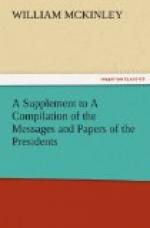The Imperial family and the Government had fled a few days before. The city was without visible control. The remaining Imperial soldiery had made on the night of the 13th a last attempt to exterminate the besieged, which was gallantly repelled. It fell to the occupying forces to restore order and organize a provisional administration.
Happily the acute disturbances were confined to the northern provinces. It is a relief to recall and a pleasure to record the loyal conduct of the viceroys and local authorities of the southern and eastern provinces. Their efforts were continuously directed to the pacific control of the vast populations under their rule and to the scrupulous observance of foreign treaty rights. At critical moments they did not hesitate to memorialize the Throne, urging the protection of the legations, the restoration of communication, and the assertion of the Imperial authority against the subversive elements. They maintained excellent relations with the official representatives of foreign powers. To their kindly disposition is largely due the success of the consuls in removing many of the missionaries from the interior to places of safety. In this relation the action of the consuls should be highly commended. In Shan-tung and eastern Chi-li the task was difficult, but, thanks to their energy and the cooperation of American and foreign naval commanders, hundreds of foreigners, including those of other nationalities than ours, were rescued from imminent peril.
The policy of the United States through all this trying period was clearly announced and scrupulously carried out. A circular note to the powers dated July 3 proclaimed our attitude. Treating the condition in the north as one of virtual anarchy, in which the great provinces of the south and southeast had no share, we regarded the local authorities in the latter quarters as representing the Chinese people with whom we sought to remain in peace and friendship. Our declared aims involved no war against the Chinese nation. We adhered to the legitimate office of rescuing the imperiled legation, obtaining redress for wrongs already suffered, securing wherever possible the safety of American life and property in China, and preventing a spread of the disorders or their recurrence.
As was then said, “The policy of the Government of the United States is to seek a solution which may bring about permanent safety and peace to China, preserve Chinese territorial and administrative entity, protect all rights guaranteed to friendly powers by treaty and international law, and safeguard for the world the principle of equal and impartial trade with all parts of the Chinese Empire.”
Faithful to those professions which, as it proved, reflected the views and purposes of the other co-operating Governments, all our efforts have been directed toward ending the anomalous situation in China by negotiations for a settlement at the earliest possible moment. As soon as the sacred duty of relieving our legation and its dependents was accomplished we withdrew from active hostilities, leaving our legation under an adequate guard in Peking as a channel of negotiation and settlement—a course adopted by others of the interested powers. Overtures of the empowered representatives of the Chinese Emperor have been considerately entertained.




